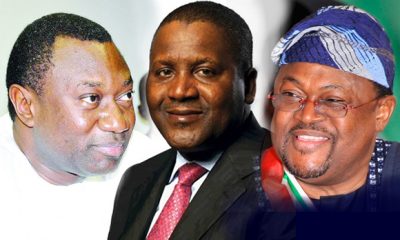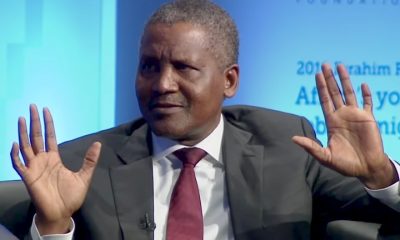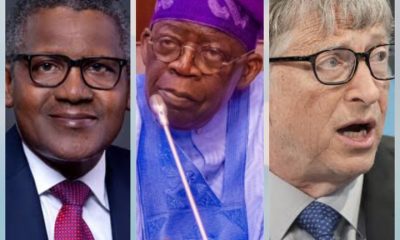Headline
Dangote Becomes $20m Wealthier, Maintains Spot As Africa’s Richest Man

Aliko Dangote, the president of Dangote Group, has added $20.7 million to his wealth as at June 30, 2023, through investments in the industrial sector — cementing his spot as Africa’s richest man.
TheCable had reported that Dangote lost $3.12 billion following Nigeria’s decision to float the local currency and unify its exchange rate system.
According to the latest Bloomberg Billionaires Index, the business mogul remains the richest man in Africa, despite the volatility of the Nigerian naira against the dollar.
In the billionaire listing released on Friday, Dangote, with a wealth of $15.6 billion, topped other Africans on the index.
This means Dangote’s wealth increased by 4 percent compared to his net worth valued at almost $15 billion in 2020, when he moved from 103rd position on the billionaire index to 63.
Hailing from Nigeria’s northern region, the serial investor has been the richest man in Africa for the 12th year running.
According to the index, Dangote is currently the 111th person and the only Nigerian on the list of the top 500 billionaires.
In May 2023, the billionaire inaugurated the Dangote petroleum refinery, an illustrious project expected to catalyse the transformation of Nigeria’s energy sector.
The inauguration came a decade after he announced plans for the refinery in September 2013, when he secured about $3.3 billion in financing for the project.
He also controls sub-Saharan Africa’s biggest cement producer, Dangote Cement, with interests in sugar, salt, fertiliser, and packaged foods.
Alongside Dangote, other Africans listed in the latest top 500 world billionaires index for the year 2023 include; Johann Rupert and family (South Africa, $13.3 billion), Nicky Oppenheimer (South Africa, $9.0 billion), Nassef Sawiris (Egypt, $7.47 billion), Natie Kirsh (South Africa, $7.37billion) and Naguib Sawiris (Egypt, $5.93 billion).
Headline
EFCC bars dollar transactions, orders embassies to charge in naira

The Economic and Financial Crimes Commission has barred foreign missions based in Nigeria from transacting in foreign currencies and mandated them to use Naira in their financial businesses.
The EFCC has also mandated Nigerian foreign missions domiciled abroad to accept Naira in their financial businesses.
The anti-graft agency said the move is to tackle the dollarisation of the Nigerian economy and the degradation of the naira
The Commission, therefore, asked the government to stop foreign missions in Nigeria from charging visa and other consular services in foreign denominations.
The EFCC gave the advisory in a letter to the Minister of Foreign Affairs, Amb. Yusuf Tuggar, for onward transmission to all foreign missions in the country.
In the letter, the EFCC said it issued the advisory because the practice of paying for consular services in dollars was in conflict with extant laws and financial regulations in Nigeria.
In a letter dated April 5, 2024, which was addressed to the Minister of Foreign Affairs, Ambassador Yusuf Tuggar, titled: “EFCC Advisory to Foreign Missions against Invoicing in US Dollar,” the EFCC Chairman, Ola Olukoyede expressed dismay over the invoicing of consular services in Nigeria by foreign missions in dollars.
The EFCC cited Section 20(1) of the Central Bank of Nigeria Act, 2007, which makes currencies issued by the apex bank the only legal tender in Nigeria.
The letter read, “I present to you the compliments of the Economic and Financial Crimes Commission, and wish to notify you about the commission’s observation, with dismay, regarding the unhealthy practice by some foreign missions to invoice consular services to Nigerians and other foreign nationals in the country in United States dollar ($).
“It states that ‘the currency notes issued by the Bank shall be the legal tender in Nigeria on their face value for the payment of any amount’.
“This presupposes that any transaction in currencies other than the naira anywhere in Nigeria contravenes the law and is, therefore, illegal.”
The commission further stated that the rejection of the naira for consular services in Nigeria by certain missions, along with non-compliance with foreign exchange regulations in determining service costs, is not just unlawful but also undermines the nation’s sovereignty embodied in its official currency.
The letter continues: “This trend can no longer be tolerated, especially in a volatile economic environment where the country’s macroeconomic policies are constantly under attack by all manner of state and non-state actors.
“In light of the above, you may wish to convey the commission’s displeasure to all missions in Nigeria and restate Nigeria’s desire for their operations not to conflict with extant laws and regulations in the country.”
Diplomatic sources said yesterday, May 10, that some embassies were wondering whether the EFCC’s advisory represented the position of the Federal Government.
Headline
Prince Harry visits sick Nigerian soldiers in Kaduna

Prince Harry and his team visited the 44 Nigerian Army Reference Hospital in Kaduna to interact with wounded soldiers who are receiving treatment.
The Duke of Sussex is in Nigeria with his wife to champion the Invictus Games, which Harry founded to aid the rehabilitation of wounded and sick servicemembers and veterans.
Nigeria joined the Invictus Community of Nations in 2022 becoming the first African country to join.
Prince Harry’s visit to Kaduna came 68 years after his late grandmother Queen Elizabeth II visited the state during the time of the late Premier of Northern Region Sir Ahmadu Bello.




-

 Headline6 days ago
Headline6 days agoPrince Harry visits sick Nigerian soldiers in Kaduna
-

 Entertainment6 days ago
Entertainment6 days agoAMVCA Cultural Day: BBNaija’s Neo, Venita win Best Dressed Male, Female
-

 Metro6 days ago
Metro6 days agoEx-Sports Minister laments after hospital neglected him for hours over N80000 deposit
-

 Headline6 days ago
Headline6 days agoEFCC bars dollar transactions, orders embassies to charge in naira














